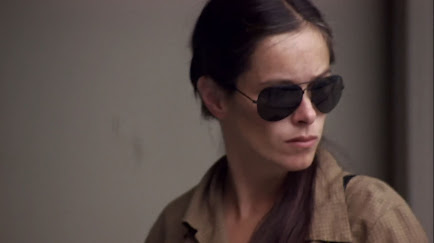Warning: Spoiler Alert. Care has been taken to conceal as
much as possible, but as this is a critical essay and not a review,
some plot points are referenced for the purpose of analysis.
“Come,
you spirits that tend on mortal thoughts, unsex me here and fill me from the
crown to the toe, top-full of direst cruelty!”
Lady Macbeth
Just as we know, with reasonable certainty, that
Shakespeare didn’t have in mind two New Jersey hairstylists when he wrote Macbeth in 1606; it’s also an odds-on
bet that said beauticians Cynthia Kellog (Demi Moore) and Joyce Urbanski
(Glenne Headly), the morality-challenged friends at the center of Alan
Rudolph’s skittish Mortal Thoughts, wouldn’t recognize
a Shakespearean quote if it was set to music and sung by Billy Joel.
Yet Lady Macbeth’s impassioned plea to the
gods to divest her of her feminine compassion and intensify her ruthlessness—the
better to realize her homicidal musings—has within it the self-same dueling conflicts
of violence/guilt/gender aggression/betrayal/loyalty/survival and desperation fueling
the tinpot stratagems that set into motion the fatal events in this nifty ‘90s neo-noir.
The castles of medieval Scotland may have nothing in common with the
brownstones of 1990 New Jersey, but when it comes to survival, woe betide the
woebegone male who dares underestimate what a woman is capable of when her
thoughts turn to matters mortal.
 |
| Demi Moore as Cynthia Kellogg |
 |
| Glenne Headly as Joyce Urbanski |
 |
| Bruce Willis as James "Jimmy" Urbanski |
 |
| Harvey Keitel as Detective John Woods |
 |
| John Pankow as Arthur Kellogg |
 |
| Billie Neal as Detective Linda Nealon |
Mortal Thoughts is an
atmospheric suspenser of doggerel Shakespearean plotting and betrayals played
out in the baseborn haven of Bayonne, New Jersey. Robert Altman protégé Alan
Rudolph, who engagingly contemporized the tropes of film noir in his films Remember My Name and Trouble in Mind, again delves into the
realm of the character-quirk crime thriller. This time using dark thoughts to motivate
the actions of a motley assortment of essentially non-thinking characters, each a late-1980s
time-piece artifact depicted in finely-observed detail and only the most
garish of local colors.
Mortal Thoughts evokes classic
film noir in both the use of a narrative framing device recalling Mildred Pierce (a loutish man is
found dead, a woman interrogated, a mystery unfolds via flashback) and in the
cunning application of a crisscross murder threat redolent of the unarticulated
alliance that got Hitchcock’s Strangers on a Train off on the right track (an amusement park even figures significantly in both films). But for
all its shrewdly effective nods to the tropes of the genre, Mortal Thoughts, in training its lethal
eye on the relationship of its two female protagonists, achieves—much like that
other, significantly more popular 1991 release, Thelma & Louise—a kind of mordant unpredictability.
There’s
a lot of tension and wit in the convincingly conveyed cronyism of Demi Moore
and Glenne Headly (the latter, hands-down, this film’s MVP), making Mortal Thoughts feel like a welcome female-centric variation of all
those macho “neighborhood buddies who go way back” crime thrillers of the sort
beloved by Martin Scorsese and John Cassavetes (whose Mickey & Nicky this film recalls).
 |
| "Your wedding was great. Except your husband...is such a...I don't know. I mean, what groom sells tools at his own wedding?" |
Cynthia
and Joyce have been friends since childhood. Each now married, they work together at a beauty salon where, along with several pounds of permed hair and shoulder pads, they balance friendship, husbands, work, and children.
Amiable
opposites, Cynthia (Moore), the level-headed one, is married to Arthur
(Pankow), a wheel-spinning go-getter type always on the hustle. Arthur is a kind
and considerate spouse, but casually dismissive of Cynthia in that way common
of fast-track husbands more in need of a “supportive wife” than an equal
partner in life. One senses Arthur tolerates Cynthia more than he understands
her, an observation driving home the equally strong impression that Cynthia’s
always-in-tow children are where her chief familial priorities lie.
The
emotionally volatile Joyce (Headly) has an obvious taste for Bad Boy types, explaining but not excusing, her explosive marriage to James (Willis); a physically
abusive, drug-dealing, macho hot-head. An accident waiting to happen, Joyce and
James, who can't even make it through their wedding day without a fight, are
one of those couples for whom passion and erupt-at-any-moment violence are but interchangeable
sides of the same dysfunctional coin. It’s in their marital DNA. So frequent and
public are their contentious outbursts, the patrons of Joyce’s Clip ‘n’ Dye hair salon, situated just below the cluttered
apartment Joyce and James share with their infant son, barely bat an eye when granted
ringside seats to the duo’s regular-as-clockwork bouts.
 |
| About now Joyce's thoughts are turning to ways of unsexing James with a pair of thinning shears |
Events reach a crisis when Arthur, impatient with Cynthia’s de facto role as peacekeeper to the dysfunctional duo (and none too fond of the battling Urbanskis to begin with), begins pressuring his wife to stop spending so much time with her erratic girlfriend. Cynthia, feeling the stress of playing moderator, conciliator, and referee both at home and in the workplace, responds by doing more of what she already does far too much of...spreading herself thin trying to appease everyone. Meanwhile, nobody seems to have taken notice that Joyce’s once easy-to-laugh-off threats to kill her husband appear to be graduating from thought to action.
Mortal Thoughts, in depicting the female side of all
those urban buddy movies, does a good
job of subtly drawing attention to the boys’ club network of protection that makes abused
wives feel they have so few options. Call the cops--they have no interest in
punishing a man for what they see as “letting off steam”; appeal to the husband’s
relatives--they see him as a good boy with a wife who provokes him; leave or
get a divorce--invite stalking and jealous retribution.
The picture painted is bleak, but as many noir films have illustrated in the past; a woman without power is not necessarily a woman without recourse.
“An accident, Dolores, can be an unhappy woman’s best friend.”
Dolores Claiborne - 1995
WHAT I LOVE ABOUT THIS MOVIE
Mortal Thoughts lets us know from the outset that someone has been killed, but only by the 30-minute mark
do we discover who it is (no big surprise there, nor do I suspect it’s supposed
to be). The lengthy setup is devoted to establishing the characters, relationships, and setting (late-‘80s working-class New Jersey lovingly, painstakingly captured in all its stone-washed, cringe-inducing glory); the remaining body of the narrative devoted to unearthing
the reverse-order specifics of the crime: the motive, the means, the when, and
by whose hand.
In
the book Flashbacks in Film: Memory &
History, author Maureen Turim cites film-noir flashbacks as being of two basic
types: the confessional and the investigative. The confessional (as exemplified
by the films Sunset Blvd. and Detour) has the lead character looking
back over the chain of events which led them to their current (often dire)
circumstances. The investigative (Laura,
A Woman’s Face) has a law official piecing
together the puzzle of a crime through means of examination and interrogation.
Mortal Thoughts
employs both methods. In present-time, narrative flashbacks are triggered by
the questions posed by two investigating detectives (Harvey Keitel and Billie
Neal) to the fidgety, on-the-defensive Cynthia regarding the murder in
question.
Keitel’s Detective John Woods makes a big show of being the good listener, simply there to take down whatever Cynthia has to tell, but his piercing eyes (taking on a mischievous glint when one of his verbal snares finds its prey) tell another story. He’s conducting a full-scale murder investigation without leaving his chair.
Keitel’s Detective John Woods makes a big show of being the good listener, simply there to take down whatever Cynthia has to tell, but his piercing eyes (taking on a mischievous glint when one of his verbal snares finds its prey) tell another story. He’s conducting a full-scale murder investigation without leaving his chair.
With
a video camera trained on her anxious face, Cynthia gives what can best be
described as cathartically frank answers to their questions, these somewhat guarded responses delivered with a studied directness intended (one
assumes) to convey an eagerness to unburden herself.
Unfortunately,
Cynthia’s recollection of events, while superficially appropriate of an
individual claiming innocence and who, as she puts it, “Didn’t do anything to
need an attorney,” has a nagging habit of getting away from her. In attempting
to provide the detectives with “just the facts” objectivity, Cynthia's subjective
impulse to protect and/or conceal tends to result in her providing considerably more detail and backstory than necessary. Always volunteering a
little more than she’s asked, Cynthia’s testimony takes on an involuntarily confessional tone, her account of the past frequently being at odds with what we’re shown.
THE
STUFF OF FANTASY
It’s
precisely when Mortal Thoughts tipped its hat to the unreliability of Cynthia as its narrator (especially since hers
is the sole perspective we share) that the film really clicked for me. The doubt
cast on the veracity of events depicted had the effect of shifting my focus
from the story to the storyteller, at which point I found myself enjoying Mortal Thoughts not only as a mystery
thriller, but as a sly dramatization of the threat of female alliance.
It’s
telling that Mortal Thoughts is
bookended by home movie footage depicting the friendship of Cynthia and Joyce
from toddler to teens. These women grew up as sisters. They are closer to each other than they are to their husbands. At first glance, it
appears as though the film’s central conflict is the detrimental effect Joyce's toxic relationship with James has on the marriage of Cynthia and Arthur, but one is reminded that neither woman is in a marriage they deem particularly satisfactory.
No, the most intimate relationship in the film is the sisterhood friendship of Cynthia
and Joyce. With this established, dramatic tension arises out of the film’s many subthemes: the inequity of
marriage; macho as the flip side of male inadequacy; how women’s relationships
are devalued by men—and how easily women internalize these attitudes—and how they relate to the film's central conflict: the threat female solidarity
represents to the male.
By way of example: James and Arthur both have scenes where they vent their
jealousy over how close Joyce and Cynthia are, each resentfully alluding to their wives
prioritizing their friendship above their marriages. These scenes are echoed in
additional sequences wherein the men are shown undermining the women's loyalties or encouraging one to betray the another (Cynthia’s
rebuff of James’ crude sexual advances is met with “What are
friends for?”).
For centuries men
have benefited from pitting women against one another for the same reason the rich benefit from convincing the poor that other poor people of a
different color are their barriers to The American Dream: there’s power in division. Misogyny
is rooted in the male anxiety of the disposable (castrated) man, and many noir films exploit this fear. I mean, what is the noir femme
fatale if not the embodiment of men’s terror of women operating under their own
agency? Mortal Thoughts plays on society's limited, dual image of women, Cynthia behaving in the maternal, care-giving manner that reassures, Joyce (the breadwinner in her household) acting as feminine aggression personified. The trick up the film's sleeve is that it dares us to assume we know what’s really going on.
“Everyone knows a woman is
fragile and helpless. Everyone’s wrong.”
Remember My Name -1978
THE STUFF OF DREAMS
A number of critics took issue with
the brooding, almost operatic visual style of grand tragedy applied to Mortal Thoughts (dramatic events play out with lots
of slow-motion and choral accompaniment), citing the incongruity of solemn gravitas applied to what is arguably a shabby homicide
set in a garish world of unsophisticated people. But the film’s baroque overemphasis on kitschy ‘80s details (and
truly, you’d have to look far to find a wittier application of hair, costume,
and production design) feels like the intentional over-amplification of small lives.
There’s
nothing noble, high-born, or honorable about any of these characters. They are human
in the most base, fundamental sense. But in Greek mythology, when the Oracle of
Delphi cryptically exhorts humans to “Think
mortal thoughts,” this ethical maxim to be heedful of one’s human limitations
reminds us how often in tragedy, characters pay a dear price for
thinking they are above their mortality. In other words, to act like gods, believing one has the right to take a life or decide who lives.
That
these larger-than-life themes play out in the small-scale environs of Hoboken,
New Jersey, makes Mortal Thoughts one
of the most intriguingly entertaining and off-beat neo-noirs since Alan Rudolph's Remember My Name.
My
fondness for the work of director Alan Rudolph (Choose Me, Afterglow, Welcome to L.A.) is what initially drew me to Mortal Thoughts. But unlike most of
his other features, Rudolph was not involved in either its writing or creation,
having been brought in on the project with only five days’ notice after original
director Claude Kervin (who wrote the incredible and incredibly funny screenplay with William Reilly) was fired two weeks into
production.
That
being said, it’s difficult to know how different Mortal Thoughts would have been had Rudolph been involved from the
start, for much of it plays out like a more coherent version of any number of
his always-fascinating, albeit occasionally jumbled, character pieces.
For
a director so skilled with actors and the intricacies of character, Rudolph
has an impressive understanding and respect for the suspense thriller genre. He
understands the importance of taking the time to establish atmosphere and mood,
he knows how to build suspense, and (like Polanski at his best) he isn’t afraid
of using humor even within the most intense scenes. I like films with strong women protagonists, and I like mysteries; so it’s no surprise that I found Mortal Thoughts to be a slick, riveting suspense film with plenty of twists and emotional tension to spare. All bolstered by a uniformly excellent (and exceptionally
well-utilized) cast.
I’ve
never been much of a Demi Moore fan and guiltily admit to never having seen her
biggest hit Ghost (even after all
this time I’m genuinely hard-pressed to think I’m missing anything), but she's absolutely terrific in this, and gives a top-notch performance. With her raspy voice (I even like her Joi-zee accent),
sardonic wit, and sharp-eyed common sense, she’s like a real-life Wilma
Flintstone; a pillar of rational-thinking stability standing in contrast to her not-wound-too-tight best friend, Joyce.
As
embodied by the late Glenne Headly (who passed away in June of 2017), Joyce is the quintessential Dangerous Woman. An outspoken trouble magnet,
Joyce is a woman who not only knows how to take care of herself, but how to get things taken
care of. She's both the toughest and most vulnerable person in the film. Headly, a remarkably resourceful actress, is a marvel to watch from start to finish (not to
mention listen to…her delivery and timing are priceless) and achieves the miracle of making her paradoxical character make absolute sense.
Bruce Willis and Demi Moore were still married when Mortal Thoughts was released, and while both were a bit off my radar at the time, my biggest recollection of them is as Hollywood's most annoying "power couple." Both were riding high on recent successes: Moore exercising her clout by serving as producer on this film, Willis, hot off of two Die Hard movies (the flop of Hudson Hawk waiting in the wings), was working off a lot of public ill-will (bad buzz from his offscreen Moonlighting behavior, a couple of ear-bleeder vanity records, and those excruciating wine cooler commercials) by taking on an against-type role in his wife’s film that dispensed with trying to make him appear either charming or likable.
Bruce Willis and Demi Moore were still married when Mortal Thoughts was released, and while both were a bit off my radar at the time, my biggest recollection of them is as Hollywood's most annoying "power couple." Both were riding high on recent successes: Moore exercising her clout by serving as producer on this film, Willis, hot off of two Die Hard movies (the flop of Hudson Hawk waiting in the wings), was working off a lot of public ill-will (bad buzz from his offscreen Moonlighting behavior, a couple of ear-bleeder vanity records, and those excruciating wine cooler commercials) by taking on an against-type role in his wife’s film that dispensed with trying to make him appear either charming or likable.
It's a savvy industry ploy for resuscitating careers of beloved onscreen personalities who prove themselves not so lovable offscreen: disliked celebrity plays the heavy or takes on self-deprecating, self-referential role thereby allowing the public to work off its animosity. Bingo! Career clemency. Willis, plagued by negative press, was wise to take on a role that played on unsavory aspects of his public image. This sort of “Give the audience permission to hate you and they’ll love you" stuff may be cynical, but I confess that I really do enjoy hating Bruce Willis in this.
 |
| Quick shout-out to personal fave and scene-stealer Harvey Keitel who does wonders with his small role. Never disappoints |
Mortal
Thoughts didn’t perform well at the boxoffice, but to me, it’s an underrated,
undiscovered gem. It’s a smart, well-acted crime thriller that not only
delivers in the suspense category, but invites the repeat viewing to appreciate
the rich characterizations, vivid production values, and razor-sharp execution. (Heh-heh.)
Really, one of my favorites.
Really, one of my favorites.
 |
| The film's first line of dialogue is also its last |
Clip from "Mortal Thoughts" (1991)
Copyright © Ken Anderson 2009 -2017











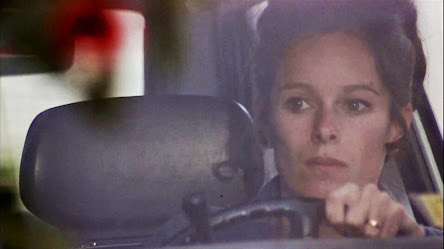

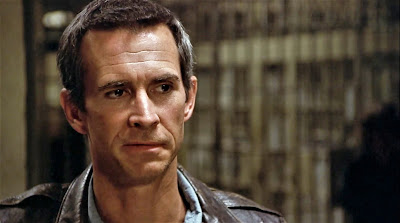

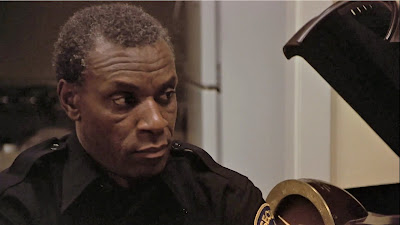


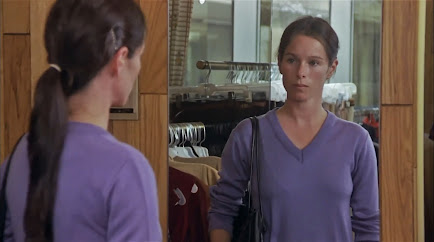

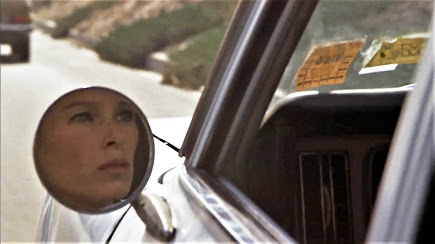
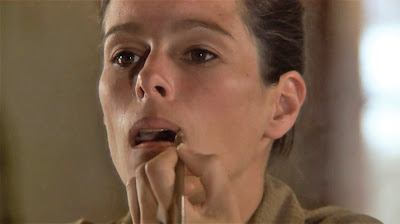






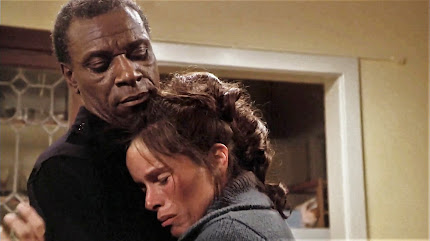

.JPG)







